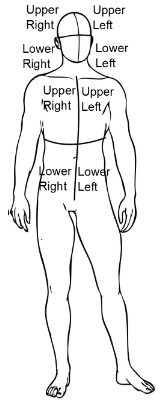Basic Information
(→4 Openings (high/low)) |
|||
| Line 3: | Line 3: | ||
divided the body into a simple four quarters (upper left, upper right, lower left, lower right) Meyer also | divided the body into a simple four quarters (upper left, upper right, lower left, lower right) Meyer also | ||
divides the head into four quarters. | divides the head into four quarters. | ||
| + | |||
One can speculate that this represents a focus on blows to the head in 16th century fechtschulen as a | One can speculate that this represents a focus on blows to the head in 16th century fechtschulen as a | ||
means of “scoring”, though it may simply be a natural extension of older terminology to provide more | means of “scoring”, though it may simply be a natural extension of older terminology to provide more | ||
accuracy/precision in practice. | accuracy/precision in practice. | ||
| + | |||
| + | Notice that the openings are specified from the point of view of the target's frame of reference, so the upper left opening referred to the target's upper left, rather than the upper left from the point of view of the attacker. | ||
| + | |||
| + | |||
| + | [[File:MeyerOpenings.png | thumb]] | ||
== Parts of the weapon == | == Parts of the weapon == | ||
Revision as of 15:44, 26 June 2016
4 Openings (high/low)
Meyer differs slightly from earlier masters in his division of the human body. Whereas earlier masters divided the body into a simple four quarters (upper left, upper right, lower left, lower right) Meyer also divides the head into four quarters.
One can speculate that this represents a focus on blows to the head in 16th century fechtschulen as a means of “scoring”, though it may simply be a natural extension of older terminology to provide more accuracy/precision in practice.
Notice that the openings are specified from the point of view of the target's frame of reference, so the upper left opening referred to the target's upper left, rather than the upper left from the point of view of the attacker.
Parts of the weapon
Meyer divides the sword further than previous masters. As you can see in the image above, aside from the usual true/false edge, he divides the blade into four sections:
- The “bind” or “haft” which includes the pommel, crossguard etc.
- The strong - the second “quarter” of the sword.
- The middle - lying between the strong and the weak.
- The weak - the tip of the sword.
